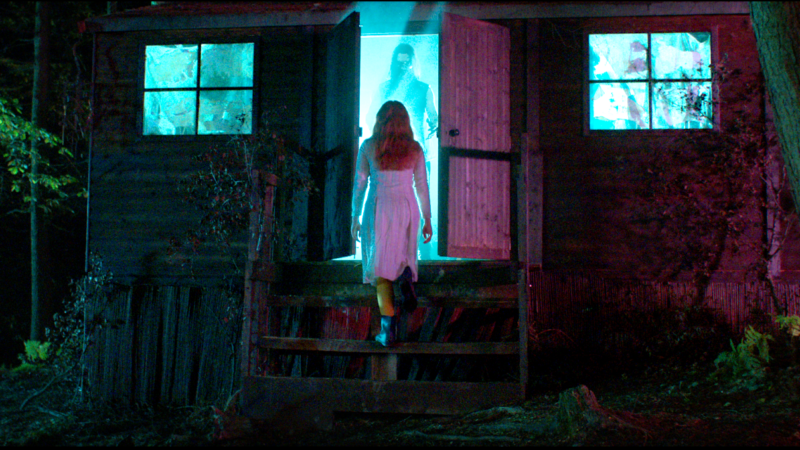Review: Censor and Flashback
Blood and confusion.

Censor
Welsh director Prano Bailey-Bond probably didn't have a lot of money to make her first feature, but that could have worked in her favor. Censor tells a story set in the trash-horror film world of the 1980s—in Britain, the era of gut-ripping "video nasty": pictures like Cannibal Holocaust, The Driller Killer, and Gestapo's Last Orgy. As everyone in this post-psychotronic age knows by now, these films were distinguished by their extreme violence and low production values—bleak sets, awkward camerawork, assertively lurid lighting. Bailey-Bond, a fan of the form with no access to major financing, has replicated those deficiencies with an easy precision.
The advent of home video in the 1970s enabled the release of such films directly to consumers, prompting much media-fueled handwringing about their possible effect on children. Naturally, the government got involved. In the '80s, video classifications were devised, with some films ruled to be appropriate only for moviegoers either 15 and over or 18 and over. People with vague credentials were hired to be censors—to gather up all the most violent and otherwise disgusting video movies on the market, and to spend their days in government offices watching and rating them, demanding cuts wherever they felt necessary. (Unsurprisingly, collateral damage was not uncommon—among the movies initially rounded up for censure was the 1982 Burt Reynolds-Dolly Parton musical, The Best Little Whorehouse in Texas.)
Censor focuses on one such warrior in the battle for video decency, Enid Baines (Irish actress Niamh Algar in a tightly controlled performance). Enid isn't a prig—she understands that pop depravity requires some degree of leeway. "I've kept in most of the screwdriver stuff," she reports of one nasty piece of work, "and I've only trimmed the tiniest bit of the end of the genitals."
Enid is sincere in her desire to protect society from these movies, but she also has a personal agenda. Years ago, her little sister Nina disappeared on a walk in the woods and has never been found. Enid believes she is still alive and is now convinced that she is one of the actors in a bloody horror film called Don't Go in the Church, the latest release from a reclusive cult sleaze director named Frederick North (Adrian Schiller). Enid seeks out North's oily producer (Michael Smiley), who offers her a part in one of his pictures. ("I'm not sure how much I like the idea of being raped and cut into pieces on camera," she says. "I'm sure the public would love it," he ickily responds.) Enid's encounter with this creep goes badly, and she moves on to track down the mysterious Frederick North in the forest where he's shooting his new film. "People think I create the horror, but I don't," he tells Enid. "The horror is already out there. In all of us. It's in you."
The movie morphs adroitly into a full-on giallo that would be familiar to past horror masters like Dario Argento or Lucio Fulci. Bailey-Bond has a distinctive sensibility of her own, though, and with the eerie and unexpected ending of this picture, she stakes a claim for a second feature, and maybe a bigger budget.
Flashback
Dylan O'Brien and Maika Monroe are both solid in Flashback—especially considering that they were surely held against their will during the making of this preposterous motion picture. The title is misleading: It should be Flashbacks, since the story (or whatever you want to call it—it's the work of director Christopher MacBride) is told entirely in time jumps. It begins with O'Brien's character, Fred Fitzell, in a hospital with his dying mom (Liisa Repo-Martell) and his attentive wife Karen (Hannah Gross). Then, over and over again, we find him back in high school, crushing on Cindy Williams (Monroe), a droll boho girl who likes to hang with the bad boys. Cindy doesn't have a lot to say, but she says it quite a bit:
"Don't let anyone influence you. Make your choice yourself."
"We have to remember the power we have – the power of choice."
"This is only one set of choices, and I exist in all of them simultaneously."
When Cindy's not nattering away in that manner, we get to hang with Fred and his old high school buddies Sebastian (Emory Cohen) and Andre (Keir Gilchrist) as they reminisce about the long-ago days when they used to party down with a drug called Mercury. (Why they would've wanted to do that is unclear, since the drug's effects on people we see taking it—crying, slobbering, rolling on the floor in terror—are not at all intriguing.)
There's also a group of odd-looking people who drift across the screen muttering words like "Numbers." "Language." "Color." "Shape." After a bit you begin to suspect that these words are part of a disjointed sentence; that if you add them up you'll get…well, who knows. There's also an unexplained character with nubbins of horns pushing up out of his forehead, as if he'd just escaped from a Hellboy roadshow. No explanation what his deal is.
Meanwhile, back in the real world (or whatever), Fred has a top job as a "data analyst" at some company in some city, and he has a swell home, and he's married to Karen—but he's still obsessing about Cindy. There's also a fabulous beach house overlooking the sea where Fred has become a painter, while Cindy reclines on the patio sipping chilled white wine. At one point, we check back in with Fred and discover that he's become a baby, just embarking on a long life of choices.
There is an elemental idea buried here, and it might have been made into an interesting movie. This is it: Every choice we make in life leads us inexorably to the place where we wind up at the end. There. Note that it didn't take 97 minutes to relay that information.


Show Comments (4)